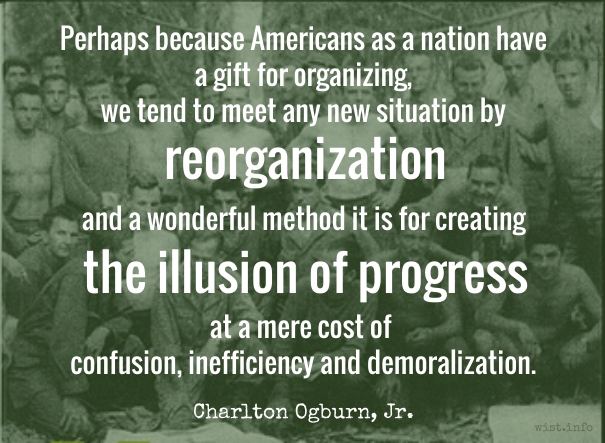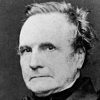You must admit that it might be confusing to have one brain and two bodies.
Edgar Rice Burroughs (1875-1950) American writer
Synthetic Men of Mars, ch. 14 [Vor Daj] (1940)
(Source)
Quotations about:
confusion
Note not all quotations have been tagged, so Search may find additional quotes on this topic.
Everyone has a confused notion of good,
On which he sets his mind, and which he desires;
And therefore everyone tries to attain it.[Ciascun confusamente un bene apprende
nel qual si queti l’animo, e disira;
per che di giugner lui ciascun contende.]Dante Alighieri (1265-1321) Italian poet
The Divine Comedy [Divina Commedia], Book 2 “Purgatorio,” Canto 17, l. 127ff (17.127-129) [Virgil] (1314) [tr. Sisson (1981)]
(Source)
(Source (Italian)). Alternate translations:
All follow good; but with uncertain aim.
At once it kindles, and it soothes their flame.
[tr. Boyd (1802), st. 32]
All indistinctly apprehend a bliss
On which the soul may rest, the hearts of all
Yearn after it, and to that wished bourn
All therefore strive to tend.
[tr. Cary (1814)]
A good each one confusedly apprehends
The mind to quiet -- satisfy desire;
Hence to attain 't will every one conspire.
[tr. Bannerman (1850)]
Each one confusedly a good conceives
Wherein the mind may rest, and longeth for it;
Therefore to overtake it each one strives.
[tr. Longfellow (1867)]
Each one confusedly apprehends a good wherein his mind may rest, and desires it ; wherefore each one strives to reach Him.
[tr. Butler (1885)]
Some good doth each confusedly apprehend.
In which to rest his spirit's longing fain,
Therefore to reach to it doth each contend.
[tr. Minchin (1885)]
Every one confusedly apprehends a good in which the mind may be at rest, and which it desires; wherefore every one strives to attain it.
[tr. Norton (1892)]
Each one apprehends vaguely a good wherein the mind may find rest, and desires it; wherefore each one strives to attain thereto.
[tr. Okey (1901)]
Everyone confusedly apprehends a good in which the mind may be at rest and desires it, so that each strives to reach it.
[tr. Sinclair (1939)]
Each one confusedly doth apprehend
A longed-for good, wherein the mind may find rest;
And therefore each one strives to attain that end.
[tr. Binyon (1943)]
Everyone vaguely pictures in his mind
A good the heart may rest on, and is driven
By his desire to seek it and to find.
[tr. Sayers (1955)]
All men, though in a vague way, apprehend
a good their souls may rest in, and desire it;
each, therefore, strives to reach his chosen end.
[tr. Ciardi (1961)]
Each one apprehends vaguely a good wherein the mind may find rest, and this it desires' wherefore each one strives to attain thereto.
[tr. Singleton (1973)]
All of you, vaguely, apprehend and crave
a good with which your heart may be at rest;
and so, each of you strives to reach that goal.
[tr. Musa (1981)]
Each apprehends confusedly a Good
in which the mind may rest, and longs for It;
and, thus, all strive to reach that Good.
[tr. Mandelbaum (1982)]
Each confusedly apprehends a Good in which his spirit may be quieted, and desires it, and therefore each strives to reach it.
[tr. Durling (2003)]
Everyone vaguely apprehends a good, where the mind finds rest: and desires it: so everyone labours to attain it.
[tr. Kline (2002)]
We all, confusedly, conceive a good,
desiring that our hearts may rest in that.
And each will strive to make their way to it.
[tr. Kirkpatrick (2007)]
Everyone can vaguely apprehend some good
in which the mind may find its peace.
With desire, each one strives to reach it.
[tr. Hollander/Hollander (2007)]
They muddle about, knowing there is goodness
In which their minds can rest, and they wish to have it,
All of them struggling to find what's so desired.
[tr. Raffel (2010)]
“So far,” said I, “is this from filling me,
I famish more than if I’d held my tongue,
And in my mind pile up perplexity.”[“Io son d’esser contento più digiuno”,
diss’io, “che se mi fosse pria taciuto,
e più di dubbio ne la mente aduno.”]Dante Alighieri (1265-1321) Italian poet
The Divine Comedy [Divina Commedia], Book 2 “Purgatorio,” Canto 15, l. 58ff (15.58-60) (1314) [tr. Sayers (1955)]
(Source)
Dante complaining about the quality of some of Virgil's answers.
(Source (Italian)). Alternate translations:
"Oft, as I drink of that celestial rill,"
I cry'd, "I find my thirst increasing still;
Its copious draughts but more inflame my soul
In search of heav'nly truth."
[tr. Boyd (1802), st. 13]
“Now lack I satisfaction more,” said I,
“Than if thou hadst been silent at the first,
And doubt more gathers on my lab’ring thought."
[tr. Cary (1814)]
"Less satisfied am I than what I was,"
I said, "than if I still had held my peace;
And in my mind still more the doubts increase."
[tr. Bannerman (1850)]
"I am more hungering to be satisfied,"
I said, "than if I had before been silent,
And more of doubt within my mind I gather."
[tr. Longfellow (1867)]
"I am more fasting from being satisfied," said I, "than if I had before held my peace, and I unite more doubt in my mind."
[tr. Butler (1885)]
"Through being contented, I do hunger more
Than if thou first hadst silent been," I said,
"And in my mind I gather doubt galore."
[tr. Minchin (1885)]
“I am more hungering to be contented,” said I, “than if I had at first been silent, and more of doubt I assemble in my mind.
[tr. Norton (1892)]
"I am more fasting from being satisfied," said I, "than if I had kept silent at first, and more perplexity I amass in my mind."
[tr. Okey (1901)]
"I am more hungry for satisfaction" I said "than if I had been silent before and my mind is more filled with perplexity."
[tr. Sinclair (1939)]
"From being satisfied I fast not less
But more," said I, "than had I question spared,
And in my mind doubt doth the more increase."
[tr. Binyon (1943)]
"I am left hungier being thus fed,
and my mind is more in doubt being thus answered,
than if I had not asked at all," I said.
[tr. Ciardi (1961)]
"I am more hungering to be satisfied," I said, "than if I had at first been silent, and more of doubt do I assemble in my mind."
[tr. Singleton (1973)]
"I hunger more for satisfaction now,”
I said, “than when I held my tongue before,
and new perplexities come to my mind."
[tr. Musa (1981)]
"I am the more starved of satisfaction,"
I said, "than if I had said nothing just now,
And more doubt collects in my mind."
[tr. Sisson (1981)]
“I am more hungry now for satisfaction"
I said, "than if I'd held my tongue before;
I host a deeper doubt within my mind."
[tr. Mandelbaum (1982)]
“I am hungrier to be contented,” I said, “than if you had been silent earlier, and I am gathering more doubt in my mind."
[tr. Durling (2003)]
I said: "I am hungrier by being fed than if I had kept silent from the start, and I have added more confusion to my mind."
[tr. Kline (2002)]
"I hunger more for satisfaction now
than if," I said, "you'd not said anything.
I gather in my mind still greater doubt."
[tr. Kirkpatrick (2007)]
"I am more starved for answers," I said,
"'than if before I had kept silent,
since now my mind is filled with greater doubt."
[tr. Hollander/Hollander (2007)]
"My hunger for knowledge is now less satisfied,"
I said, "than if I had never asked the question,
And the more doubt collects in my troubled mind."
[tr. Raffel (2010)]
For always the man in whom thought springs up over thought sets his mark farther off, for the one thought saps the force of the other.
[Ché sempre l’omo in cui pensier rampolla
sovra pensier, da sé dilunga il segno,
perché la foga l’un de l’altro insolla]Dante Alighieri (1265-1321) Italian poet
The Divine Comedy [Divina Commedia], Book 2 “Purgatorio,” Canto 5, l. 16ff (5.16-18) (1314) [tr. Sinclair (1939)]
(Source)
Virgil telling Dante he's overthinking things, letting himself be distracted.
(Source (Italian)). Alternate translations:
He, that permits his Fancy thus to stray.
With every lure, will rarely find his way
To that great end, to which his soul is bent:
For gath'ring fancies warp the steady light
Of Reason's beam, and leave her whelm'd in night,
For ever baffled of her first intent.
[tr. Boyd (1802), st. 3]
He, in whose bosom thought on thought shoots out,
Still of his aim is wide, in that the one
Sicklies and wastes to nought the other’s strength.
[tr. Cary (1814)]
He in whose bosom thought springs up to thought,
Destroys himself the figures of his loom --
The birth of one prepares the others's tomb.
[tr. Bannerman (1850)]
For evermore the man in whom is springing
Thought upon thought, removes from him the mark,
Because the force of one the other weakens.
[tr. Longfellow (1867)]
For ever the man, in whom thought wells up over thought, removes far from himself his mark, because the rush of the second slackens the first.
[tr. Butler (1885)]
Always the man in whom new thought doth grow
On previous thought, from his true course doth roam,
Because the one doth flag the other's glow.
[tr. Minchin (1885)]
For always the man in whom thought on thought wells up removes from himself his aim, for the force of one weakens the other.
[tr. Norton (1892)]
For ever the man in whom thought wells up on thought, sets back his mark, because the one saps the force of the other.
[tr. Okey (1901)]
For always he in whom thought overtakes
The former thought, his goal less clearly sees.
Because the one the other must relax.
[tr. Binyon (1943)]
He aims beside the mark whose fancies bubble
One on another, driving back and drumming
Each other out, so that his eye sees double.
[tr. Sayers (1955)]
For when a man lets his attention range
toward every wisp, he loses true direction,
sapping his mind's force with continual change.
[tr. Ciardi (1961)]
For always the man in whom thought wells
up on thought sets back his mark,
for one thought weakens the force of the other.
[tr. Singleton (1973)]
The man who lets his thoughts be turned aside
by one thing or another, will lose sight
of his true goal, his mind sapped of its strength.
[tr. Musa (1981)]
Because the man in whom thoughts bubble up
One after the other, goes wide of the mark,
Because one thought weakens the force of another.
[tr. Sisson (1981)]
The man in whom thought thrusts ahead of thought
allows the goal he’s set to move far off --
the force of one thought saps the other’s force.
[tr. Mandelbaum (1982)]
For always the man in whom one care sprouts above the other makes his target more distant, because the impulse of the one weakens the other.
[tr. Durling (2003)]
Since the man, in whom thought rises on thought, sets himself back, because the force of the one weakens the other.
[tr. Kline (2002)]
When thought is bred too rampantly from thought,
then, of himself, a man will miss the mark.
Each mental thrust debilitates the first.
[tr. Kirkpatrick (2007)]
For any man who lets one thought --
and then another -- take him over
will soon lose track of his first goal.
[tr. Hollander/Hollander (2007)]
A man whose mind is distracted lets thought after thought
Keep him from getting where he wants to go:
They hammer each other down; nothing can grow.
[tr. Raffel (2010)]
By those, that deepest feel, are ill exprest
The indistinctness of the suffering breast;
Where thousand thoughts begin to end in one,
Which seeks from all the refuge found in none;
No words suffice the secret soul to show.
And Truth denies all eloquence to Woe.George Gordon, Lord Byron (1788-1824) English poet
The Corsair, Canto 3, st. 22, l. 1807ff (1814)
(Source)
We can’t be creative if we refuse to be confused. Change always starts with confusion; cherished interpretations must dissolve to make way for what’s new.
Margaret J. "Meg" Wheatley (b. 1944) American writer, teacher, speaker, management consultant
Turning to One Another, “Willing to Be Disturbed” (2002)
(Source)
Things look different when seen in a different light. So look at them in the light of happiness. Don’t confuse good and bad.
[Hace muy diferentes visos una misma cosa si se mira a diferentes luces: mírese por la de la felicidad. No se han de trocar los frenos al bien y al mal.]
Baltasar Gracián y Morales (1601-1658) Spanish Jesuit priest, writer, philosopher
The Art of Worldly Wisdom [Oráculo Manual y Arte de Prudencia], § 224 (1647) [tr. Maurer (1992)]
(Source)
(Source (Spanish)). Alternate translations:
One and the same thing, hath its good day, and its bad. Examine it on the fairest side. We must not give the contrary reines to good and evil.
[Flesher ed. (1685)]
The same thing looks quite different in another light; look at it therefore on its best side and do not exchange good for evil.
[tr. Jacobs (1892)]
For one and the same thing has very different faces, as seen in different lights; look upon it in its happiest light, and do not get the controls mixed, as to what is good and what is bad.
[tr. Fischer (1937)]
It is characteristic of all deep human problems that they are not to be approached without some humor and some bewilderment.
Freeman Dyson (1923-2020) English-American theoretical physicist, mathematician, futurist
Disturbing the Universe, ch. 1 (1979)
(Source)
Where shall wisdom be found, and where is the place of understanding? If I knew, I’d walk over and stand there. As it was, I felt as if I stood in the midst of a large map, surrounded by vague areas wherein were penned the visages of particularly nasty-looking random variables. A perfect place for a soliloquy, if one had anything to say.
For things false lie so close to things true, and things that cannot be perceived to things that can, […] that it is the duty of the wise man not to trust himself to such a steep slope.
[Ita enim finitima sunt falsa veris, eaque, quae percipi non possunt, iis quae possunt […] ut tam in praecipitem locum non debeat se sapiens committere.]
Marcus Tullius Cicero (106-43 BC) Roman orator, statesman, philosopher
Academica, Book 2, ch. 21 / sec. 68 (2.68) (45 BC) [tr. Rackham (1933)]
(Source)
(Source (Latin)). Alternate translation:
For falsehoods lie so close to truths, and "appearances" which cannot be perceived to those which can, [...] that the man of wisdom ought not to trust himself on such hazardous ground.
[tr. Reid (1874)]
False and true, and innapprehensible and apprehensible are so close to each other, [...] that the wise person shouldn't commit himself to such a precarious position.
[tr. Brittain (2005)]
So near is falsehood to truth that a wise man would do well not to trust himself on the narrow edge.
[Source]
Life can be confusing. Good God, and how. Sometimes it seems like the older I get, the more confused I become. That seems ass-backwards. I thought I was supposed to be getting wiser. Instead, I just keep getting hit over the head with my relative insignificance in the greater scheme of the universe. Confusing, life.
But it beats the hell out of the alternative.
The secret language of statistics, so appealing in a fact-minded culture, is employed to sensationalize, inflate, confuse, and oversimplify. Statistical methods and statistical terms are necessary in reporting the mass data of social and economic trends, business conditions, “opinion” polls, the census. But without writers who use the words with honesty and understanding and readers who know what they mean, the result can only be semantic nonsense.
The Universe has as many different centers as there are living beings in it. Each of us is a center of the Universe, and that Universe is shattered when they hiss at you “You are under arrest.” If you are arrested, can anything else remain unshattered by this cataclysm? But the darkened mind is incapable of embracing these displacements in our universe, and both the most sophisticated and the veriest simpleton among us, drawing on all life’s experience, can gasp out only: “Me? What for?”
Alexander Solzhenitsen (1918-2008) Russian novelist, emigre [Aleksandr Isayevich Solzhenitsyn]
The Gulag Archipelago, Vol. 1, Part 1, ch. 1 (1973) [tr. Whitney]
(Source)
If everybody always lies to you, the consequence is not that you believe the lies, but rather that nobody believes anything any longer. This is because lies, by their very nature, have to be changed, and a lying government has constantly to rewrite its own history. On the receiving end you get not only one lie — a lie which you could go on for the rest of your days — but you get a great number of lies, depending on how the political wind blows. And a people that no longer can believe anything cannot make up its mind. It is deprived not only of its capacity to act but also of its capacity to think and to judge. And with such a people you can then do what you please.
Hannah Arendt (1906-1975) German-American philosopher, political theorist
Interview with Roger Errera (Oct 1973), The New York Review of Books (26 Oct 1978)
(Source)
I like handling newborn animals. Fallen into life from an unmappable world, they are the ultimate immigrants, full of wonder and confusion.
Diane Ackerman (b. 1948) American poet, author, naturalist
The Moon by Whale Light, ch. 4 “White Lanterns” (1991)
(Source)
Was none who would be foremost
To lead such dire attack;
But those behind cried “Forward!”
And those before cried “Back!”Thomas Babington Macaulay (1800-1859) English writer and politician
“Horatius,” st. 50, Lays of Ancient Rome (1842)
(Source)
Life is easy to chronicle, but bewildering to practice.
E. M. Forster (1879-1970) English novelist, essayist, critic, librettist [Edward Morgan Forster]
A Room with a View, ch. 14 (1908)
(Source)
I like too many things and get all confused and hung-up running from one falling star to another till I drop. This is the night, what it does to you. I had nothing to offer anybody except my own confusion.
Jack Kerouac (1922–1969) Canadian-American novelist and poet
On the Road, Part 2, ch. 4 (1957)
(Source)
And I have again observed, my dear friend, in this trifling affair, that misunderstandings and neglect occasion more mischief in the world than even malice and wickedness. At all events, the two latter are of less frequent occurrence.
[Und ich habe, mein Lieber, wieder bei diesem kleinen Geschäft gefunden, dass Missverständnisse und Trägheit vielleicht mehr Irrungen in der Welt machen als List und Bosheit. Wenigstens sind die beiden letzteren gewiss seltener.]
Johann Wolfgang von Goethe (1749-1832) German poet, statesman, scientist
Die Leiden des jungen Werthers [The Sorrows of Young Werther], “Letter from May 4th” (1774)
Alt. trans.: "Misunderstandings and neglect create more confusion in this world than trickery and malice. At any rate, the last two are certainly much less frequent."
The income tax has made more liars out of the American people than golf has. Even when you make a tax form out on the level, you don’t know when it’s through if you are a crook or a martyr.
Will Rogers (1879-1935) American humorist
Column (1923-04-07), “Weekly Article: Helping Girls With Their Income Tax”
(Source)
Collected by Rogers in The Illiterate Digest (1924).
The whole of life is just like watching a [film], he thought. Only it’s as though you always get in ten minutes after the big picture has started, and no one will tell you the plot, so you have to work it all out yourself from the clues. And you never, never get a chance to stay in your seat for the second house.
We trained hard, but it seemed that every time we were beginning to form up into teams we would be reorganized. Presumably the plans for our employment were being changed. I was to learn later in life that, perhaps because we are so good at organizing, we tend as a nation to meet any new situation by reorganizing; and a wonderful method it can be for creating the illusion of progress while producing confusion, inefficiency and demoralization.
Charlton Ogburn, Jr. (1911-1998) American journalist, author
“Merrill’s Marauders: The truth about an incredible adventure,” Harper’s Magazine (Jan 1957)
In his 1959 book, The Marauders, Ogburn rephrased this as: "As a result, I suppose, of high-level changes of mind about how we were to be used, we went through several reorganizations. Perhaps because Americans as a nation have a gift for organizing, we tend to meet any new situation by reorganization, and a wonderful method it is for creating the illusion of progress at a mere cost of confusion, inefficiency and demoralization."
Sometimes incorrectly cited to Gaius Petronius Arbiter. For more on this quotation, see here.
To let a sudden fit of anger make you forget the dangers you risk for yourself and for those who are nearest and dearest to you — is this not clouded judgment?
[A. 一朝之忿、忘其身以及其親、非惑與。]
[B. 一朝之忿忘其身以及其亲非惑与]
Confucius (c. 551- c. 479 BC) Chinese philosopher, sage, politician [孔夫子 (Kǒng Fūzǐ, K'ung Fu-tzu, K'ung Fu Tse), 孔子 (Kǒngzǐ, Chungni), 孔丘 (Kǒng Qiū, K'ung Ch'iu)]
The Analects [論語, 论语, Lúnyǔ], Book 12, verse 21 (12.21) (6th C. BC – AD 3rd C.) [tr. Chin (2014)]
(Source)
Waley suggests the internal rhymes in both the questions in 12.21 and this particular answer mean they are quotations from an outside source, a "didactic poem," and thus carry additional meaning now lost.
(Source (Chinese) A, B). Alternate translations:
For a morning's anger to disregard one's own life, and involve that of his parents; -- is not this a case of delusion?
[tr. Legge (1861)]
And as to illusions, is not one morning's fit of anger, causing a man to forget himself, and even involving the consequences those who are near and dear to him -- is not that an illusion?
[tr. Jennings (1895)]
If a man allows himself to lose his temper and forget himself of a morning, in such a way as to become careless for the safety of is own person and for the safety of his parents and friends: -- is that not a case of a great delusion in life?
[tr. Ku Hung-Ming (1898)]
For a morning's anger to forget his own safety and involve that of his relatives, is not this irrational?
[tr. Soothill (1910)]
For one morning’s temper to jeopard one's life and even that of one's relatives, isn’t that hallucination?
[tr. Pound (1933)]
Because of a morning's blind rage to forget one's own safety and even endanger one's kith and kin, is that not a case of divided mind?
[tr. Waley (1938)]
In a moment’s burst of anger to forget oneself and one’s family. Wouldn’t this be utter confusion?
[tr. Ware (1950)]
To let a sudden fit of anger make you forget the safety of your own person or even that of your parents, is that not misguided judgment?
[tr. Lau (1979)]
To be oblivious of one's own person and even of one's own parents all because of a morning's anger -- is this not a confusion?
[tr. Dawson (1993)]
To endanger oneself and one's kin in a sudden fit of anger: is this not an instance of incoherence?
[tr. Leys (1997)]
In a fit of rage, you forget yourself and even your parents -- is that not delusion?
[tr. Huang (1997)]
If one has any anger so that one forgets one's pro0per behavior to take the anger upon the relatives, is not one confused?
[tr. Cai/Yu (1998), #307]
In a moment of rage to forget not only one's own person but even one's parents -- is this not being in a quandary?
[tr. Ames/Rosemont (1998)]
For the anger of a morning, to forget one's self and even one's kin, is that not a contradiction?
[tr. Brooks/Brooks (1998)]
To endanger yourself and your family, all in a morning's blind rage -- is that not delusion?
[tr. Hinton (1998)]
To forget yourself in a moment of anger and thereby bring ruin upon both you and your family -- is this not an example of confusion?
[tr. Slingerland (2003)]
Because of one morning's anger, to forget your own safety and even endanger those close to you -- this is faulty thinking, isn't it?
[tr. Watson (2007)]
If you act out of animus with the consequence of hurting yourelf and yoru loved ones, is that an example of delusion?
[tr. Li (2020)]
A common paraphrase of this is "When anger rises, think of the consequences." This is attributed to Confucius in Kang-Hi (K'ang-hsi, Kangxi) The Sacred Edict, Maxim #16 (1670, 1724) [tr. Milne (1817)]. An alternate translation is "In anger, think of the trouble" [tr. Baller (1892), ch. 16, sec. 15]
What, then, is time? I know well enough what it is, provided that nobody asks me; but if I am asked what it is and try to explain, I am baffled.
[Quid est ergo tempus? Si nemo ex me quaerat, scio; si quaerenti explicare velim, nescio.]
Augustine of Hippo (354-430) Christian church father, philosopher, saint [b. Aurelius Augustinus]
Confessions, Book 11, ch. 14 / ¶ 17 (11.14.17) (c. AD 398) [tr. Pine-Coffin (1961)]
(Source)
(Source (Latin)). Alternate translations:
What then is time? If no one asks me, I know: if I wish to explain it to one that asketh, I know not.
[tr. Pusey (1838)]
What then is time? If no one asks me, I know; if I wish to explain it to one that asketh, I know not.
[ed. Shedd (1860)]
What, then, is time? If no one ask of me, I know; if I wish to explain to him who asks, I know not.
[tr. Pilkington (1876)]
What then is time? If no one asks me, I know; if I want to explain it to a questioner, I do not know.
[tr. Sheed (1943)]
What, then, is time? If no one asks me, I know what it is. If I wish to explain it to him who asks me, I do not know.
[tr. Outler (1955)]
What, then, is time? If no one asks me, I know; if I want to explain it to someone who does ask me, I do not know.
[tr. Ryan (1960)]
What then is time? I know what it is if no one asks me what it is; but if I want to explain it to someone who has asked me, I find that I do not know.
[tr. Warner (1963)]
On two occasions I have been asked, — “Pray, Mr. Babbage, if you put into the machine wrong figures, will the right answers come out?” In one case a member of the Upper, and in the other a member of the Lower, House put this question. I am not able rightly to apprehend the kind of confusion of ideas that could provoke such a question.
Charles Babbage (1791-1871) English mathematician, computer pioneer, philosopher
Passages from the Life of a Philosopher, ch. 5 “Difference Engine No. 1” (1864)
(Source)


























